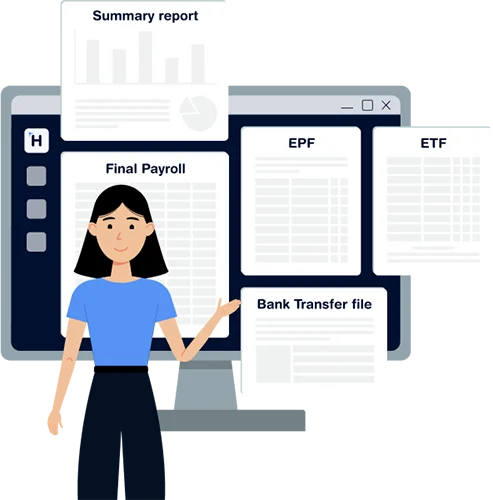You’re probably wondering what payroll has got to do with job satisfaction. It directly impacts on your employees’ experience in terms of their job satisfaction. This is why this article will explore how you could make your employees feel that they are important through payroll assistance.
Exploring the different aspects of payroll contributing to job satisfaction
You must understand the different ways how payroll contributes to job satisfaction by adopting efficient payroll management software, which includes the features below:
1. Flawless salary and tax calculations
To avoid salary disputes and delays, it’s pivotal to use payroll management software that simplifies salary and tax calculations. It shows your employees that you respect and appreciate their time and effort in working for you. According to a study by Science Alert on ‘Impact of Compensation and Benefits on Job Satisfaction’, it was reported that there is a positive relationship between compensation and job satisfaction and that rewarding your employees on time maintains employment in the business and earns the loyalty and commitment of the employee.
2. Integrating payroll management software with time and attendance systems
Automated time and attendance systems record accurate data and clarify the employees on their shifts and overtime payments. This provides an idea for the employees regarding their final salary when looking at the breakdown.
3. Accurate leave record management
By adopting an accurate leave record management, employees get notified of their pending leave requests.
4. Employee self-service app
Rather than employees running after the HR manager to remind them to approve their leaves and waiting for their turn to record their time in and time out through a fingerprint device, employees can easily access their salary structure and record their attendance and leave records through their mobile phone.
This gives a sense of ownership to the employees over their information and thereby increases job satisfaction.
On-time payroll leading to on-time staff salary payments
Even though your business is small, processing payroll can sometimes be lengthy and complicated, resulting in delayed salary payments. As a result, small businesses should ensure that their payroll is processed effectively to produce accurate staff salary payments on time. If not, this can lead to dissatisfaction among the employees and violate labour-related laws.
That being said, small businesses should ensure that they organize their payroll process to pay staff salary payments on time while complying with labour laws in making sure payments are made on time.
Employee benefits, including healthcare and other allowances reflected in the payroll
There are various kinds of employee benefit allowances reflected on the payroll. These are payments provided to employees to benefit them for a particular purpose. Some of the allowances are usually common, and some of them depend on the circumstances or occasion. That being said, common allowances include:
- Healthcare allowance – This is any payment made by an employer to fund an employee’s healthcare expenditure. It can be in the form of a health insurance scheme, or the employer can reimburse a fixed amount as payment for the healthcare expenditure incurred by the employee.
- Travel allowance – An employer compensates an employee for travelling to work and from work to their home, especially if the employee lives too far away from work or doesn’t have any means of transport to work.
- Budgetary Relief Allowance – This is a mandatory allowance introduced by the government under The Budgetary Relief Allowance of Workers Act No. 4 of 2016, which requires employers to pay Rs. 2500 in two installments to employees earning less than Rs. 40,000. However, if an employee is making more than Rs. 40,000 but doesn’t exceed Rs. 41,500, the allowance to be paid is the difference between the actual amount earned and Rs. 41,500. If an employer breaches this allowance, enforcement action may be taken against the employer.
Apart from these common allowances, other allowances reflected in payroll are bonus allowance paid during festive seasons, internet allowance, and mobile allowance, which are paid for employees working from home. It’s nevertheless important to note that the common allowances and other allowances mentioned above are subject to the policies of different companies. That means some businesses award allowances while some businesses don’t.
How integrated leave-payroll can contribute to better job satisfaction through accurate representation of effort put in
A leave management system integrated with your small business payroll will automatically track employees’ working hours, overtime, and leave days to provide accurate payslips. Some businesses run payroll and the leave management system independent of each other. Still, it’s more beneficial to integrate both systems to handle punctuality consistently, leave, and payroll to provide better job satisfaction.
If your small business is still running its leave management system and payroll separately, here is why you should consider integrating both the systems by keeping the employees’ job satisfaction in mind:
1. Saves time and effort in data processing and double handling
Since both systems use broad employee information, it’s practical for both systems to share the same database. Attendance, leave, salary remittance and tax records can be recorded and entered accurately by entering an employee’s information in one go. This reduces unwanted tension among employees and HR and thus contributes to employee job satisfaction.
2. Enhances accuracy and compliance
Integrating the leave management system and payroll will reduce unnecessary errors in an employee’s salary caused by negligent data entry, oversight or lousy communication by HR. You shouldn’t underestimate the damage that a single data entry error could do to your employees and business. Miscalculations and underpayment of an employee’s salary can lead to resignations and dissatisfaction, and they’ll lose hope in the effort they put in at work merely because of such inaccuracies.
The worst thing that could happen to your small business is being subject to fines for not complying with labour-related laws.
3. Enhances employee experience through better job satisfaction
The Ministry of Business, Innovation and Employment in New Zealand reported that underpayments could affect more than 700,000 employees. Kronos said that 49% of workers would start job hunting after experiencing two problems with their salary, and 24% of workers will go job hunting after one mistake with their pay.
4. Better employee management and reporting
By integrating both systems, the management will clearly understand employee leaves and how much their absences are costing the small business. Employees will be able to access their information, and they will be well informed about their leave, salary and other benefits.
Legal implications of delayed/inaccurate staff salaries and statutory payments
It’s essential to remember that delayed or inaccurate staff salaries can be subject to legal penalties. The Internal Revenue Service, which is a statutory body in the United States of America which is responsible for collecting taxes, reported that there were 6 billion USD worth of employer penalties for miscalculating or missing tax payments. Based on the Wage Boards Ordinance of Sri Lanka, an employee’s wage includes any salary due to overtime or holidays. The Wage Boards Ordinance can fix a specific wage period for a particular trade and mention the days at the end of which employer should pay wages to the employees. However, the wage payment period cannot exceed more than a month.
If the employer cannot pay the salary within the salary deadline, the employer should pay the salary at the earliest possible. The Wages Boards Ordinance and the Shop & Office Employees Act specifically require the employer not to deduct an employee’s salary other than those legally authorized. Deductions imposed by law relating to income tax collection at source, EPF deductions (8% of a worker’s total monthly earnings) and deductions on payments to approved provident funds, etc. Therefore, if an employer makes unlawful deductions, there is a risk of prosecution and fines.
For information on penalties imposed on delayed statutory payments, click https://www.gethumanised.com/payroll/5-main-sri-lankan-payroll-statutory-payments/ to visit our article on the 5 main statutory payments to run payroll in Sri Lanka.
How a proper payroll system inclusive of on-time salary payments, benefits or allowances, can improve your small business’s performance and reputation
A payroll system impacts the daily operations of a small business, and yet, most businesses often fail to realize its importance. A payroll system ensures that on-time salary payments are consistent. Still, it also provides that the benefits and allowances included in payroll improve the business’s performance and reputation. It encourages employees to work harder in an encouraging and rewarding working environment, attracting potential employees.
Moreover, a payroll system which ensures that relevant taxes are paid on time, and the business complies with other employment regulations demonstrates to the outside world that the business is reliable and reputable.
We hope that, as employers, you understand the importance of adopting a proper payroll to ensure job satisfaction is achieved among all your small business employees. If not, the consequences can be dire!
Resources
https://perkpayroll.com/blog/4-ways-payroll-can-boost-employee-engagement/
https://www.tide.co/blog/business-tips/payroll-processing/
https://blog.myhr.works/advantages-of-integrated-leave-management-payroll-systems
https://salary.lk/labour-law/work-and-wages
https://practical.software/the-importance-of-a-payroll-system-at-your-company/



